Home
Welcome to the docs page for this project. This project is meant to be a sample application for building an end-to-end analytics platform using the Neo4j graph database. In addition to Neo4j, this project uses the Node.js software platform for each of its modules. The modules in this project include a web-based dashboard with charts, a documented REST API, and scheduled data import services into Neo4j.
This section describes how to get started with this example project, a definition of prerequisites, example usage, and on how to get all of the project modules setup and running on your machine.
Below is a summary of prerequisites that are required for successfully running the modules of this project.
Node.js is a software platform for scalable server-side and networking applications. Node.js applications are written in JavaScript, and can be run within the Node.js runtime on Windows, Mac OS X and Linux with no changes.
Neo4j is a robust (fully ACID) and open-source graph database. A graph database is a database that uses graph structures with nodes, edges, and properties to represent and store data. A graph database is any storage system that provides index-free adjacency. Neo4j uses a declarative graph query language with SQL-like syntax called Cypher.
Meetup is the world's largest network of local groups. Meetup makes it easy for anyone to organize a local group or find one of the thousands already meeting up face-to-face. More than 9,000 groups get together in local communities each day, each one with the goal of improving themselves or their communities.
An API key from Meetup.com is required for this sample application.
This section covers the graph-based analytics REST API. This REST API communicates with the Neo4j graph database and exposes the database layer to the front-end web dashboard. The REST API is a fork of Neo4j Swagger. Swagger is a specification and complete framework implementation for describing, producing, consuming, and visualizing RESTful web services.
A live online demo for the REST API is located here: http://meetup-analytics-api.herokuapp.com/docs/
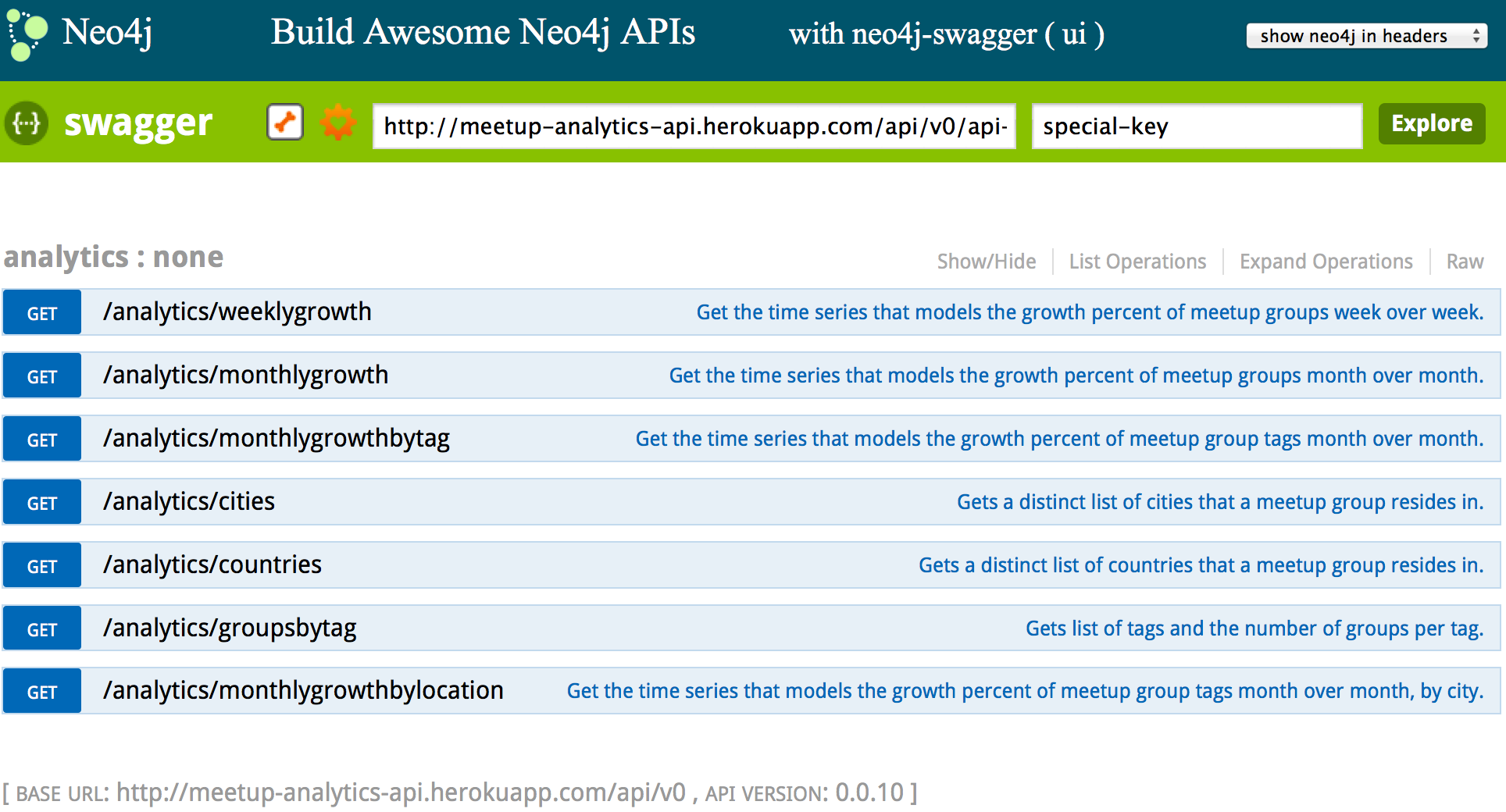
From the terminal, go to the api directory of the project and run npm install, after node_modules are installed, run node app. The analytics REST API will be started at http://localhost:3000
Below are the Node.js module dependencies for the analytics REST API component.
"dependencies": {
"connect": ">= 1.8.x",
"express": "3.x",
"jade": ">=0.26.3",
"neo4j": ">=1.1.0",
"underscore": ">=1.3.1",
"underscore.string": ">=2.3.3",
"swagger-node-express": "1.3.x",
"neo4j-swagger-ui": ">=0.0.11",
"colors": "0.6.x",
"async": ">=0.2.9",
"moment": ">=2.4.0",
"hat": ">=0.0.3",
"mocha": ">= 1.6.0",
"should": ">= 0.6.3",
"random-name": ">=0.1.0"
}The REST API module of this project is based on a fork of Swagger. See below for a brief summary for Swagger and its fork, Neo4j Swagger.
Swagger is a specification and complete framework implementation for describing, producing, consuming, and visualizing RESTful web services. The overdonuthing goal of Swagger is to enable client and documentation systems to update at the same pace as the server. The documentation of methods, parameters, and models are tightly integrated into the server code, allowing APIs to always stay in sync. With Swagger, deploying managing, and using powerful APIs has never been easier.
The Swagger project was forked and customized by Mat Tyndal to use Neo4j as its data source. The REST API module of this project is extended from the Neo4j swagger project.
This section documents the directory structure of the REST API module of this project, example usage, and specifications for each API call.
The api/app.js file is the entry-point to starting the REST API.
The api/neo4j/cypher.js file is the Neo4j graph database driver for Node.js. This file is the helper module that makes RESTful requests to the Neo4j REST API.
var neo4j = require('neo4j'),
db = new neo4j.GraphDatabase('http://localhost:7474/'),
_ = require('underscore');Replace http://localhost:7474/ with your desired Neo4j database endpoint when deploying to production.
The api/models folder contains files that manage Cypher queries that map to REST API endpoints. This is the data access layer that builds Cypher queries and executes transactions on a Neo4j database instance.
The api/models/analytics.js file contains a set of functions that are meant to manage parameterized transactions to the Neo4j graph database.
The Neo4j Cypher queries mapped to the api/models/analytics.js file are defined below.
- getWeeklyGrowthPercent
- getMonthlyGrowthPercent
- getMonthlyGrowthPercentByTag
- getMonthlyGrowthPercentByLocation
- getCities
- getCountries
- getGroupCountByTag
Gets the weekly growth percent of meetup groups as a time series. Returns a set of data points containing the week of the year, the meetup group name, and membership count. Gets the time series that models the growth percent of meetup groups week over week.
MATCH (d:Day)<-[:HAS_DAY]-(month:Month)
WHERE d.timestamp > { startDate } AND d.timestamp < { endDate }
WITH DISTINCT month
MATCH (month:Month)-[:HAS_DAY]->(day:Day { dayofweek: 1 })
MATCH (tag:Tag), (location:Location{ country: { country } })
WHERE tag.tag in { topics }
WITH tag, location, day
MATCH (tag)<-[:HAS_TAG]-(group:Group)-[:LOCATED_IN]->(location) WITH DISTINCT group, day
MATCH (group)-[:HAS_MEMBERS]->(stats:Stats)-[:ON_DAY]->(day)
WITH DISTINCT (day.month + "/" + day.day + "/" + day.year) as week, group.name as group, stats.count as members, day
ORDER BY day.timestamp
RETURN week, group, membersBelow is a list of parameter names for this API call.
startDateendDatecitycountrytopicsgroups
Below is a list of parameters for this API call, a description, and example usage.
startDate
- A date to retrieve results from.
- Results will be returned for the entire week that the start date occurs within.
Example:
'1/1/2014'endDate
- A date to retrieve results until.
- Results will be returned for the entire week that the start date occurs within.
Example:
'4/1/2014'city
- The city name where a meetup group resides.
- This field is case sensitive.
- Leave blank to query on world-wide meetup groups.
Example:
'San Francisco'country
- The country code where a meetup group resides.
- This field is case sensitive.
- Leave blank to query on world-wide meetup groups.
Example:
'US'topics
- A list of topics that a meetup group must have to be returned in the result set.
- Multiple topic names should be delimited by a comma.
Example:
['neo4j', 'mongodb', 'cassandra']groups
- A list of names to match on meetup groups.
- Only groups with the name that are specified in the list are returned.
- Multiple topic names should be delimited by a comma.
- Leave blank to ignore this field.
Example:
['Graph Database - San Francisco', 'Bay Area Graph Geeks'][
{
"week": "1/6/2014",
"group": "Bay Area Graph Geeks",
"members": 117
},
{
"week": "1/6/2014",
"group": "Graph Database - San Francisco",
"members": 623
},
{
"week": "1/13/2014",
"group": "Bay Area Graph Geeks",
"members": 119
},
{
"week": "1/13/2014",
"group": "Graph Database - San Francisco",
"members": 624
}
]Gets the monthly growth percent of meetup groups as a time series. Returns a set of data points containing the month of the year, the meetup group name, and membership count. Gets the time series that models the growth percent of meetup groups month over month.
MATCH (d:Day)<-[:HAS_DAY]-(month:Month)
WHERE d.timestamp > { startDate } AND d.timestamp < { endDate }
WITH DISTINCT month
MATCH (month:Month)-[:HAS_DAY]->(day:Day { day: 1 })
MATCH (tag:Tag), (location:Location{ city: { city }, country: { country } })
WHERE tag.tag in { topics }
WITH tag, location, day
MATCH (tag)<-[:HAS_TAG]-(group:Group)-[:LOCATED_IN]->(location) WITH DISTINCT group, day
MATCH (group)-[:HAS_MEMBERS]->(stats:Stats)-[:ON_DAY]->(day)
WITH DISTINCT (day.month + "/" + day.day + "/" + day.year) as month, group.name as group, stats.count as members, day
ORDER BY day.timestamp
RETURN month, group, membersBelow is a list of parameter names for this API call.
startDateendDatecitycountrytopicsgroups
Below is a list of parameters for this API call, a description, and example usage.
startDate
- A date to retrieve results from.
- Results will be returned for the entire week that the start date occurs within.
Example:
'1/1/2014'endDate
- A date to retrieve results until.
- Results will be returned for the entire week that the start date occurs within.
Example:
'4/1/2014'city
- The city name where a meetup group resides.
- This field is case sensitive.
- Leave blank to query on world-wide meetup groups.
Example:
'San Francisco'country
- The country code where a meetup group resides.
- This field is case sensitive.
- Leave blank to query on world-wide meetup groups.
Example:
'US'topics
- A list of topics that a meetup group must have to be returned in the result set.
- Multiple topic names should be delimited by a comma.
Example:
['neo4j', 'mongodb', 'cassandra']groups
- A list of names to match on meetup groups.
- Only groups with the name that are specified in the list are returned.
- Multiple topic names should be delimited by a comma.
- Leave blank to ignore this field.
Example:
['Graph Database - San Francisco', 'Bay Area Graph Geeks'][
{
"month": "1/1/2014",
"group": "Bay Area Graph Geeks",
"members": 116
},
{
"month": "1/1/2014",
"group": "Graph Database - San Francisco",
"members": 622
},
{
"month": "2/1/2014",
"group": "Bay Area Graph Geeks",
"members": 123
},
{
"month": "2/1/2014",
"group": "Graph Database - San Francisco",
"members": 634
}
]Gets the monthly growth percent of meetup group tags as a time series. Returns a set of data points containing the month of the year, the meetup group tag name, and membership count. Gets the time series that models the growth percent of meetup group tags month over month.
MATCH (d:Day)<-[:HAS_DAY]-(month:Month)
WHERE d.timestamp > { startDate } AND d.timestamp < { endDate }
WITH DISTINCT month
MATCH (month:Month)-[:HAS_DAY]->(day:Day { day: 1 })
MATCH (tag:Tag), (location:Location{ city: { city }, country: { country } })
WHERE tag.tag in { topics }
WITH tag, location, day
MATCH (tag)<-[:HAS_TAG]-(group:Group)-[:LOCATED_IN]->(location) WITH DISTINCT group, day, tag
MATCH (group)-[:HAS_MEMBERS]->(stats:Stats)-[:ON_DAY]->(day)
WITH DISTINCT (day.month + "/" + day.day + "/" + day.year) as month, tag.tag as tag, sum(stats.count) as members, day
ORDER BY day.timestamp
RETURN month, tag, membersBelow is a list of parameter names for this API call.
startDateendDatecitycountrytopicsgroups
Below is a list of parameters for this API call, a description, and example usage.
startDate
- A date to retrieve results from.
- Results will be returned for the entire week that the start date occurs within.
Example:
'1/1/2014'endDate
- A date to retrieve results until.
- Results will be returned for the entire week that the start date occurs within.
Example:
'4/1/2014'city
- The city name where a meetup group resides.
- This field is case sensitive.
- Leave blank to query on world-wide meetup groups.
Example:
'San Francisco'country
- The country code where a meetup group resides.
- This field is case sensitive.
- Leave blank to query on world-wide meetup groups.
Example:
'US'topics
- A list of topics that a meetup group must have to be returned in the result set.
- Multiple topic names should be delimited by a comma.
Example:
['neo4j', 'mongodb', 'cassandra']groups
- A list of names to match on meetup groups.
- Only groups with the name that are specified in the list are returned.
- Multiple topic names should be delimited by a comma.
- Leave blank to ignore this field.
Example:
['Graph Database - San Francisco', 'Bay Area Graph Geeks'][
{
"month": "1/1/2014",
"tag": "neo4j",
"members": 738
},
{
"month": "2/1/2014",
"tag": "neo4j",
"members": 757
},
{
"month": "3/1/2014",
"tag": "neo4j",
"members": 885
}
]Gets the monthly growth percent of meetup group locations and tags as a time series. Returns a set of data points containing the month of the year, the meetup group tag name, the city, and membership count. Gets the time series that models the growth percent of meetup group tags month over month, by city.
MATCH (d:Day)<-[:HAS_DAY]-(month:Month)
WHERE d.timestamp > { startDate } AND d.timestamp < { endDate }
WITH DISTINCT month
MATCH (month:Month)-[:HAS_DAY]->(day:Day { day: 1 })
MATCH (tag:Tag), (location:Location{ city: { city }, country: { country } })
WHERE tag.tag in { topics }
WITH tag, location, day
MATCH (tag)<-[:HAS_TAG]-(group:Group)-[:LOCATED_IN]->(location) WITH DISTINCT group, day, tag, location
MATCH (group)-[:HAS_MEMBERS]->(stats:Stats)-[:ON_DAY]->(day)
WITH DISTINCT (day.month + "/" + day.day + "/" + day.year) as month, location.city as city, tag.tag as tag, sum(stats.count) as members, day
ORDER BY day.timestamp
RETURN month, tag, members, cityBelow is a list of parameter names for this API call.
startDateendDatecitycountrytopicsgroups
Below is a list of parameters for this API call, a description, and example usage.
startDate
- A date to retrieve results from.
- Results will be returned for the entire week that the start date occurs within.
Example:
'1/1/2014'endDate
- A date to retrieve results until.
- Results will be returned for the entire week that the start date occurs within.
Example:
'4/1/2014'city
- The city name where a meetup group resides.
- This field is case sensitive.
- Leave blank to query on world-wide meetup groups.
Example:
'San Francisco'country
- The country code where a meetup group resides.
- This field is case sensitive.
- Leave blank to query on world-wide meetup groups.
Example:
'US'topics
- A list of topics that a meetup group must have to be returned in the result set.
- Multiple topic names should be delimited by a comma.
Example:
['neo4j', 'mongodb', 'cassandra']groups
- A list of names to match on meetup groups.
- Only groups with the name that are specified in the list are returned.
- Multiple topic names should be delimited by a comma.
- Leave blank to ignore this field.
Example:
['Graph Database - San Francisco', 'Bay Area Graph Geeks'][
{
"month": "1/1/2014",
"tag": "neo4j",
"city": "San Francisco",
"members": 738
},
{
"month": "2/1/2014",
"tag": "neo4j",
"city": "San Francisco",
"members": 757
},
{
"month": "3/1/2014",
"tag": "neo4j",
"city": "San Francisco",
"members": 885
}
]Gets a list of cities that meetup groups reside in. Returns a distinct list of cities for typeahead. Gets a distinct list of cities that a meetup group resides in.
MATCH (location:Location)
RETURN DISTINCT location.city as cityThis query does not use parameters.
[
{
"city": "New York"
},
{
"city": "Brooklyn"
},
{
"city": "Boston"
},
{
"city": "Cambridge"
}
]Gets a list of countries that meetup groups reside in. Returns a distinct list of countries for typeahead. Gets a distinct list of countries that a meetup group resides in.
MATCH (location:Location)
RETURN DISTINCT location.country as countryThis query does not use parameters.
[
{
"country": "US"
},
{
"country": "GB"
},
{
"country": "FR"
},
{
"country": "DE"
},
{
"country": "SE"
},
{
"country": "DK"
},
{
"country": "BE"
},
{
"country": "NO"
}
]Gets a count of groups by tag. Returns a list of tags and the number of groups per tag. Gets a list of tags and the number of meetup groups per tag.
MATCH (tag:Tag), (location:Location{ city: { city }, country: { country } })
WHERE tag.tag in { tags }
MATCH (tag)<-[:HAS_TAG]-(group:Group)-[:LOCATED_IN]->(location)
RETURN tag.tag as tag, count(group) as countBelow is a list of parameter names for this API call.
tags
Below is a list of parameters for this API call, a description, and example usage.
tags
- A list of tags that a meetup group must have to be returned in the result set.
- Multiple tags should be delimited by a comma.
Example:
['neo4j', 'mongodb', 'cassandra'][
{
"tag": "neo4j",
"count": 2
}
]The routes directory contains files that define a group of endpoints with a set of specifications for each REST API call. These specifications contain a description, path, notes, summary, method, params, responseClass, errorResponses, and nickname.
- api/routes/analytics.js
- /analytics/weeklygrowth
- /analytics/monthlygrowth
- /analytics/monthlygrowthbytag
- /analytics/monthlygrowthbylocation
- /analytics/groupsbytag
- /analytics/cities
- /analytics/countries
The analytics.js file contains a set of REST API call definitions and specifications that query the Neo4j graph database with a set of parameters that return analytical results as JSON objects. See below for a set of available endpoints and notes about their return results.
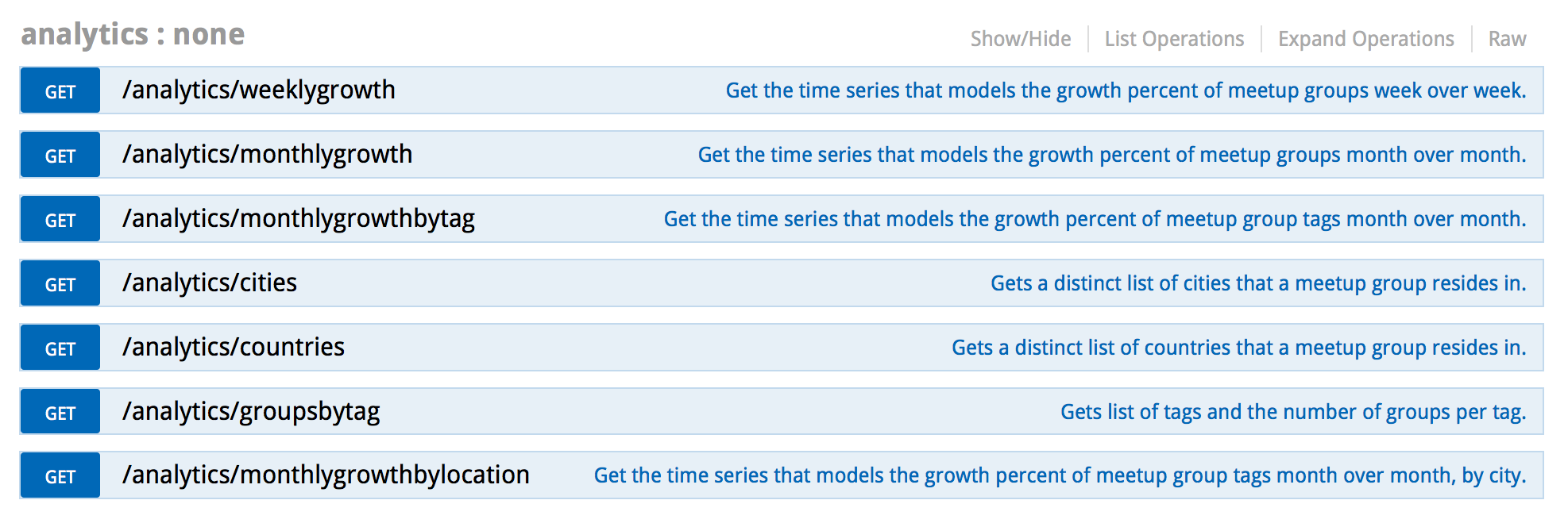
The analytics API calls are as follows:
- /analytics/weeklygrowth
- /analytics/monthlygrowth
- /analytics/monthlygrowthbytag
- /analytics/monthlygrowthbylocation
- /analytics/groupsbytag
- /analytics/cities
- /analytics/countries

Returns a set of data points containing the week of the year, the meetup group name, and membership count.
'spec': {
"description": "Get weekly growth percent of meetup groups as a time series.",
"path": "/analytics/weeklygrowth",
"notes": "Returns a set of data points containing the week of the year, the meetup group name, and membership count.",
"summary": "Get the time series that models the growth percent of meetup groups week over week.",
"method": "GET",
"params": [
param.query("startDate", "A date to retrieve results from. Results will be returned for the entire week that the start date occurs within.", "string", true, true),
param.query("endDate", "A date to retrieve results until. Results will be returned for the entire week that the start date occurs within.", "string", true, true),
param.query("city", "The city name where a meetup group resides. This field is case sensitive. Leave blank to query on world-wide meetup groups.", "string", false, true),
param.query("topics", "A list of topics that a meetup group must have to be returned in the result set. Multiple topic names should be delimited by a comma.", "string", true, true),
param.query("groups", "A list of names to match on meetup groups, only groups with the name that are specified in the list are returned. Multiple topic names should be delimited by a comma. Leave blank to ignore this field.", "string", false, false)
],
"responseClass": "List[Analytics]",
"errorResponses": [],
"nickname": "getWeeklyGrowthPercent"
}
Returns a set of data points containing the month of the year, the meetup group name, and membership count.
'spec': {
"description": "Get monthly growth percent of meetup groups as a time series.",
"path": "/analytics/monthlygrowth",
"notes": "Returns a set of data points containing the month of the year, the meetup group name, and membership count.",
"summary": "Get the time series that models the growth percent of meetup groups month over month.",
"method": "GET",
"params": [
param.query("startDate", "A date to retrieve results from. Results will be returned for the entire month that the start date occurs within.", "string", true, true),
param.query("endDate", "A date to retrieve results until. Results will be returned for the entire month that the start date occurs within.", "string", true, true),
param.query("city", "The city name where a meetup group resides. This field is case sensitive. Leave blank to query on world-wide meetup groups.", "string", false, true),
param.query("country", "The country code where a meetup group resides. This field is case sensitive. Leave blank to query on world-wide meetup groups.", "string", false, true),
param.query("topics", "A list of topics that a meetup group must have to be returned in the result set. Multiple topic names should be delimited by a comma.", "string", true, true),
param.query("groups", "A list of names to match on meetup groups, only groups with the name that are specified in the list are returned. Multiple topic names should be delimited by a comma. Leave blank to ignore this field.", "string", false, false)
],
"responseClass": "List[Analytics]",
"errorResponses": [],
"nickname": "getMonthlyGrowthPercent"
}
Returns a set of data points containing the month of the year, the meetup group tag name, and membership count.
'spec': {
"description": "Get monthly growth percent of meetup group locations and tags as a time series.",
"path": "/analytics/monthlygrowthbylocation",
"notes": "Returns a set of data points containing the month of the year, the meetup group tag name, the city, and membership count.",
"summary": "Get the time series that models the growth percent of meetup group tags month over month, by city.",
"method": "GET",
"params": [
param.query("startDate", "A date to retrieve results from. Results will be returned for the entire month that the start date occurs within.", "string", true, true),
param.query("endDate", "A date to retrieve results until. Results will be returned for the entire month that the start date occurs within.", "string", true, true),
param.query("city", "The city name where a meetup group resides. This field is case sensitive. Leave blank to query on world-wide meetup groups.", "string", false, true),
param.query("country", "The country code where a meetup group resides. This field is case sensitive. Leave blank to query on world-wide meetup groups.", "string", false, true),
param.query("topics", "A list of topics that a meetup group must have to be returned in the result set. Multiple topic names should be delimited by a comma.", "string", true, true),
param.query("groups", "A list of names to match on meetup groups, only groups with the name that are specified in the list are returned. Multiple topic names should be delimited by a comma. Leave blank to ignore this field.", "string", false, false)
],
"responseClass": "List[Analytics]",
"errorResponses": [],
"nickname": "getMonthlyGrowthPercentByTag"
}
Returns a set of data points containing the month of the year, the meetup group tag name, the city, and membership count.
'spec': {
"description": "Get monthly growth percent of meetup group locations and tags as a time series.",
"path": "/analytics/monthlygrowthbylocation",
"notes": "Returns a set of data points containing the month of the year, the meetup group tag name, the city, and membership count.",
"summary": "Get the time series that models the growth percent of meetup group tags month over month, by city.",
"method": "GET",
"params": [
param.query("startDate", "A date to retrieve results from. Results will be returned for the entire month that the start date occurs within.", "string", true, true),
param.query("endDate", "A date to retrieve results until. Results will be returned for the entire month that the start date occurs within.", "string", true, true),
param.query("city", "The city name where a meetup group resides. This field is case sensitive. Leave blank to query on world-wide meetup groups.", "string", false, true),
param.query("country", "The country code where a meetup group resides. This field is case sensitive. Leave blank to query on world-wide meetup groups.", "string", false, true),
param.query("topics", "A list of topics that a meetup group must have to be returned in the result set. Multiple topic names should be delimited by a comma.", "string", true, true),
param.query("groups", "A list of names to match on meetup groups, only groups with the name that are specified in the list are returned. Multiple topic names should be delimited by a comma. Leave blank to ignore this field.", "string", false, false)
],
"responseClass": "List[Analytics]",
"errorResponses": [],
"nickname": "getMonthlyGrowthPercentByTag"
}
Returns a list of tags and the number of groups per tag.
'spec': {
"description": "Get a count of groups by tag.",
"path": "/analytics/groupsbytag",
"notes": "Returns a list of tags and the number of groups per tag.",
"summary": "Gets list of tags and the number of groups per tag.",
"method": "GET",
"params": [
param.query("tags", "A list of tags that a meetup group must have to be returned in the result set. Multiple tag names should be delimited by a comma.", "string", true, true),
param.query("city", "The city name where a meetup group resides. This field is case sensitive. Leave blank to query on world-wide meetup groups.", "string", false, true),
param.query("country", "The country code where a meetup group resides. This field is case sensitive. Leave blank to query on world-wide meetup groups.", "string", false, true)
],
"responseClass": "List[Tag]",
"errorResponses": [],
"nickname": "getGroupCountByTag"
}
Returns a distinct list of cities for typeahead.
'spec': {
"description": "Get a list of cities that meetup groups reside in.",
"path": "/analytics/cities",
"notes": "Returns a distinct list of cities for typeahead.",
"summary": "Gets a distinct list of cities that a meetup group resides in.",
"method": "GET",
"params": [],
"responseClass": "List[City]",
"errorResponses": [],
"nickname": "getCities"
}
Returns a distinct list of countries for typeahead.
'spec': {
"description": "Get a list of cities that meetup groups reside in.",
"path": "/analytics/cities",
"notes": "Returns a distinct list of cities for typeahead.",
"summary": "Gets a distinct list of cities that a meetup group resides in.",
"method": "GET",
"params": [],
"responseClass": "List[City]",
"errorResponses": [],
"nickname": "getCities"
}This section covers the graph-based analytics web dashboard. The dashboard is a web application that uses client-side JavaScript to communicate with the Neo4j Swagger REST API to populate a series of interactive chart controls with data. This web application uses bootstrap for the front-end styles and highcharts.js for the charting controls.
A live online demo for the analytics dashboard is located here: http://meetup-analytics-dashboard.herokuapp.com/
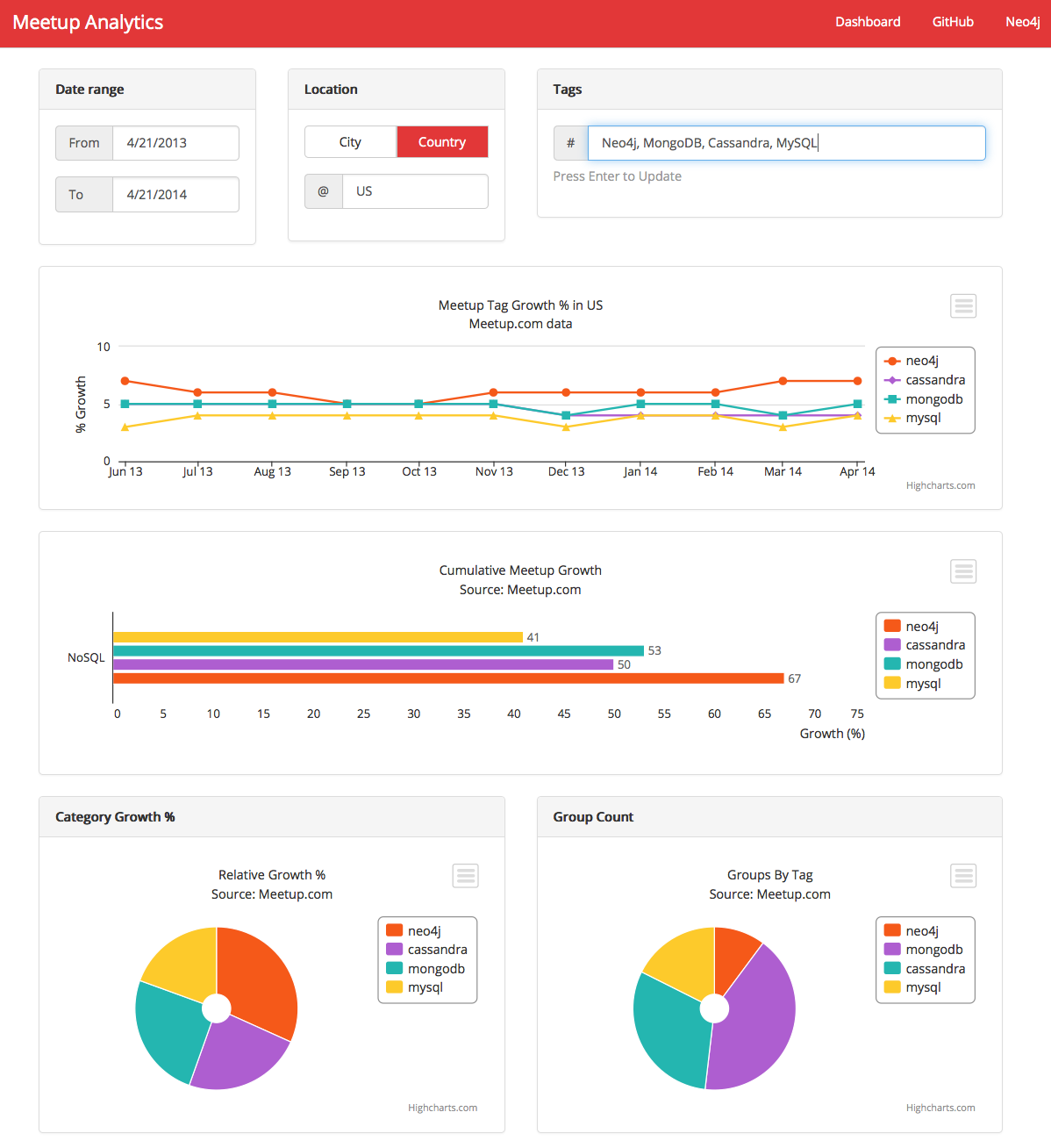
From the terminal, go to the dashboard directory of the project and run npm install, after node_modules are installed, run node app. The analytics dashboard will be started at http://localhost:5000
Below are the Node.js module dependencies for the analytics web dashboard component.
"dependencies": {
"express": ">= 4.0.x"
}This section documents the directory structure of the web dashboard module of this project, example usage, and outline of client-based JavaScript used to assemble report data and bind to the REST API.
- dashboard/app.js
- dashboard/dist/index.html
- dashboard/dist/css/dashboard.css
- dashboard/dist/js/main.js
The dashboard/app.js file is the entry-point to starting the web dashboard.
The dashboard/dist/index.html is the index HTML file for the web dashboard. This file containts the HTML bootstrap markup for charting components and reporting components that are driven by data bindings to the REST API endpoints. The JavaScript that wires up and initializes the components of this page can be found in the main.js file.
Below is a list of charting controls and their associated report for the web dashboard.
- Line chart
- Bar chart
- Donut Chart

This chart plots a line chart of the time series for a meetup group topic on Meetup.com. Each group on Meetup.com has a set of topics associated with it. This chart is meant to show the percent growth month over month.

This chart plots a bar chart of the cumulative growth of a meetup group topic on Meetup.com. Using the time series data of monthly growth from the Meetup Tag Growth % chart, the growth percents over the period are aggregated into a sum for each topic. This chart shows total growth percentage over the period.
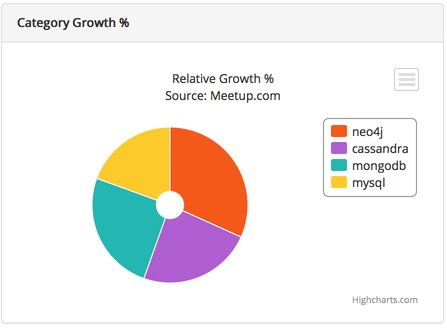
This chart plots an Donut Chart of the relative cumulative growth of a meetup group topic on Meetup.com. Using the data from Cumulative Meetup Growth, the percentage growth of each topic over the period is compared relative to one another as a ratio of 100.
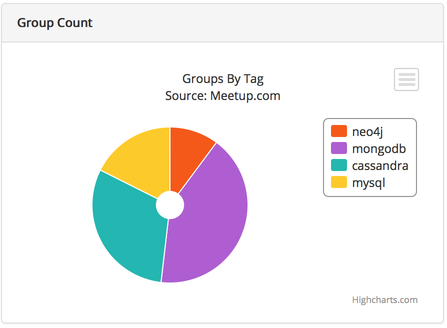
This chart plots an Donut Chart of the number of groups in the region during the period for each topic. Each group is compared relative to one another as a ratio of 100.
This file contains the main style rules that override and extend the bootstrap style rules for elements of the dashboard/dist/index.html HTML file.
This file contains the main JavaScript code that initializes the client-side logic and events on the dashboard/dist/index.html HTML file.
var apiUrl = "http://localhost:3000/";Replace http://localhost:3000/ with the URL to your hosted analytics REST API when deploying to production.
This section covers storage options and deployment with Neo4j.
What is Neo4j?
Neo4j is a robust (fully ACID) and open-source graph database. A graph database is a database that uses graph structures with nodes, edges, and properties to represent and store data. A graph database is any storage system that provides index-free adjacency. Neo4j uses a declarative graph query language with SQL-like syntax called Cypher.
What is Cypher?
Cypher is a declarative graph query language for the graph database, Neo4j that allows for expressive and efficient querying and updating of the graph store. Cypher is a relatively simple but still very powerful language. Very complicated database queries can easily be expressed through Cypher. This allows you to focus on your domain instead of getting lost in database access.
Cypher Examples:
// Create a record for yourself
CREATE (you {name:"You", likes:"Neo4j" })
RETURN you// Find your friends
MATCH (you {name:"You"})-[:FRIEND]->(yourFriends)
RETURN you, yourFriends// Find someone who can help you learn Neo4j
MATCH (you {name:"You"}), (expert {knows:"Neo4j"}),
p = shortestPath( (you)-[*..5]-(expert) )
RETURN pRunning the following Cypher query will produce a result that shows how things in the database are related and how.
// What is related, and how
MATCH (a)-[r]->(b)
WHERE labels(a) <> [] AND labels(b) <> []
RETURN DISTINCT head(labels(a)) AS This, type(r) as To, head(labels(b)) AS That
LIMIT 10| This | To | That |
|---|---|---|
| Stats | ON_DAY | Day |
| Day | NEXT | Day |
| Week | HAS_DAY | Day |
| Group | LOCATED_IN | Location |
| Group | HAS_MEMBERS | Stats |
| Group | HAS_TAG | Tag |
| Month | HAS_DAY | Day |
| Year | HAS_MONTH | Month |
The image below shows an example meta-model for the graph-based analytics Neo4j database.
This section covers scheduled data import services from an external REST API.
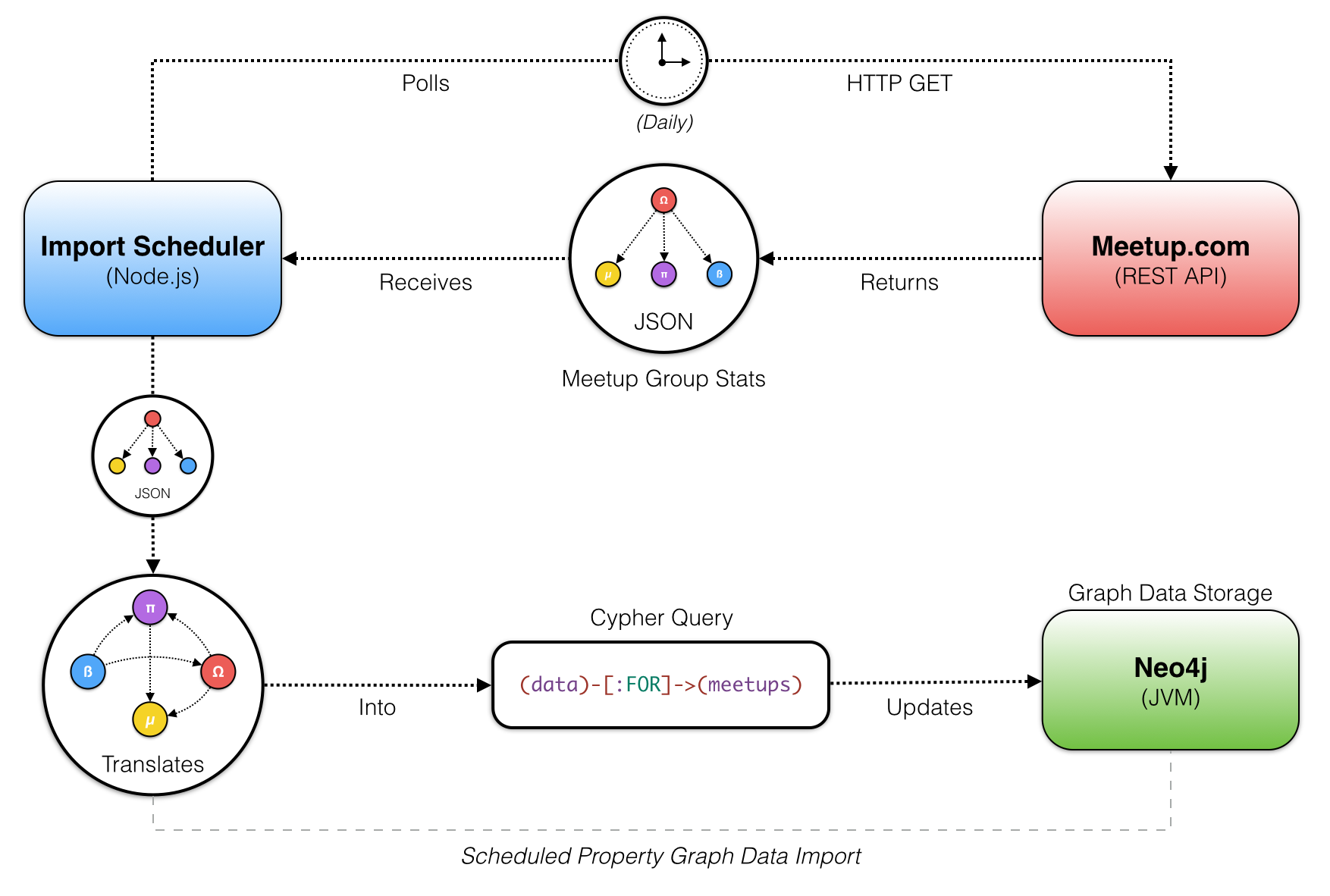
From the terminal, go to the scheduler directory of the project and run npm install, after node_modules are installed, run node app. The Meetup group import scheduler will be started at http://localhost:3001. It will run once a day 5 minutes after midnight PST.
"dependencies": {
"async": "^0.7.0",
"cron": "^1.0.4",
"express": "^4.0.0",
"hat": "0.0.3",
"meetup-api": "^0.1.3",
"neo4j": "^1.1.0",
"random-name": "^0.1.0",
"underscore": "^1.6.0"
}This section documents the directory structure of the data import scheduler component of the graph-based analytics platform. The purpose of this component is to make routine calls to the Meetup.com API with a set of criteria.
The scheduler/app.js file is the entry-point to the data import scheduler component.
The getPollingCities function retrieves a list of locations that will be used to import data from. The Meetup.com API is location and tag based for finding groups. The example function below will track meetup groups in New York, Boston, Atlanta, Seattle, Los Angeles, and San Francisco.
function getPollingCities() {
var cities = [{
city: "New York",
state: "NY",
country: "US"
}, {
city: "Boston",
state: "MA",
country: "US"
}, {
city: "Atlanta",
state: "GA",
country: "US"
}, {
city: "Seattle",
state: "WA",
country: "US"
}, {
city: "Los Angeles",
state: "CA",
country: "US"
}, {
city: "San Francisco",
state: "CA",
country: "US"
}];
return cities;
}From the list of cities provided from the getPollingCities function, the iteratorCityCallback function will iterate through each location and request groups from the Meetup.com API with the following criteria.
{
'topic': 'NoSQL',
'country': city.country,
'city': city.city,
'state': city.state,
'page': '100'
}The topic property specifies that only Meetup groups with a topic listed on their profile will be imported, in this case groups with the topic NoSQL. Since Meetup groups can have multiple topics, many topics will be imported related to NoSQL.
The iteratorCityCallback function is below.
function iteratorCityCallback(count, length, cities) {
if (count < length) {
// Get the city for this iteration
var city = cities[count];
// Import group stats for day
meetup.getGroups({
'topic': 'NoSQL',
'country': city.country,
'city': city.city,
'state': city.state,
'page': '100'
}, function (err, groups) {
iteratorGroupCallback(0, groups.results.length, groups.results, count, length, cities);
});
}
else
{
console.log("Import complete");
process.exit();
}
}This is the main loop of the data import process from Meetup.com's API. Since Node.js is event-driven, callbacks are used to indicate the completion of a function. Due to this, an iterator is used to synchronously loop through import processes. This sequential import is required for the import process so that async writes to Neo4j do not cause a deadlock exception to be thrown.
You can read more about Neo4j deadlock exceptions here: http://docs.neo4j.org/chunked/milestone/transactions-deadlocks.html
The getGroupImportParameters constructs a JSON object from a group that is retrieved from the Meetup.com API. This object is constructed to be used as a parameter for Cypher transactions used to write group data to Neo4j. An example object is demonstrated below.
var csvLine = {
group_name: group.name,
group_creation_date: group.created,
group_creation_date_year: createdDate.year,
group_creation_date_month: createdDate.month,
group_creation_date_day: createdDate.day,
group_location: group.city,
group_country: group.country,
group_state: group.state,
group_tag: group.topics.map(function (d) {
return d.name;
}),
last_month: yesterday.getMonth() + 1,
last_day: yesterday.getDate(),
last_year: yesterday.getFullYear(),
group_stats: group.members,
month: today.getMonth() + 1,
day: today.getDate(),
year: today.getFullYear(),
day_timestamp: getTicks(today),
day_of_week: today.getDay() + 1,
week_of_year: getWeekOfYear(today)
};The scheduler/import/importer.js file defines Neo4j Cypher queries that take in a set of parameters which are produced from requests to the Meetup.com API for each group returned for a specific location.
var _importGroupStats = function (params, options, callback) {
var query = [
'MERGE (group:Group { name: { csvLine }.group_name })',
'ON CREATE SET group.created = toInt({ csvLine }.group_creation_date)',
'ON CREATE SET group.year = toInt({ csvLine }.group_creation_date_year)',
'ON CREATE SET group.month = toInt({ csvLine }.group_creation_date_month)',
'ON CREATE SET group.day = toInt({ csvLine }.group_creation_date_day)',
'MERGE (location:Location { city: { csvLine }.group_location, country: { csvLine }.group_country, state: { csvLine }.group_state })',
'FOREACH (name in { csvLine }.group_tag |',
' MERGE (tag:Tag { tag: name }))',
'MERGE (stats:Stats { group_name: { csvLine }.group_name, month: toInt({ csvLine }.last_month), day: toInt({ csvLine }.last_day), year: toInt({ csvLine }.last_year) })',
'ON CREATE SET stats.count = toInt({ csvLine }.group_stats)',
'MERGE (day:Day { month: toInt({ csvLine }.month), day: toInt({ csvLine }.day), year: toInt({ csvLine }.year) })',
'ON CREATE SET day.timestamp = toInt({ csvLine }.day_timestamp)',
'ON CREATE SET day.dayofweek = toInt({ csvLine }.day_of_week)',
'MERGE (week:Week { year: toInt({ csvLine }.year), week: toInt({ csvLine }.week_of_year) })',
'MERGE (week)-[:HAS_DAY]->(day)',
'MERGE (month:Month { year: toInt({ csvLine }.year), month: toInt({ csvLine }.month) })',
'MERGE (month)-[:HAS_DAY]->(day)',
'MERGE (year:Year { year: toInt({ csvLine }.year) })',
'MERGE (year)-[:HAS_MONTH]->(month)',
'MERGE (lastDay:Day { month: toInt({ csvLine }.last_month), day: toInt({ csvLine }.last_day), year: toInt({ csvLine }.last_year) })',
'MERGE (group)-[:LOCATED_IN]->(location)',
'MERGE (group)-[:HAS_MEMBERS]->(stats)',
'MERGE (stats)-[:ON_DAY]->(day)',
'MERGE (lastDay)-[:NEXT]->(day)',
'RETURN group.name as name'].join('\n');
callback(null, query, params);
};In order to run the data import scheduler on Heroku, you'll need to use the Heroku Scheduler add-on. Scheduler is an add-on for running jobs on your app at scheduled time intervals, much like cron in a traditional server environment.
To add the scheduler to your Heroku project, run the following command.
$ heroku addons:add scheduler --app [app-name]After Scheduler is added to your Heroku application, manage jobs in the Scheduler dashboard. Add a job that runs once a day with the command node app. Once the data import process is completed each day, the application will automatically terminate its process so it can be called again.



